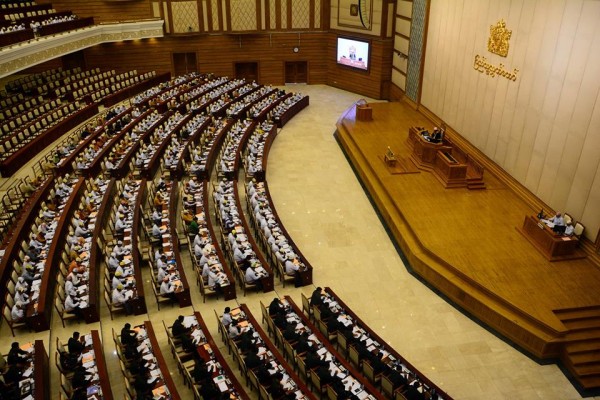Burma’s president Thein Sein has newly rejected a call by parliament to facilitate dialogue for charter reform.
A message, sent by the president to the freshly reconvened parliamentary session on Monday, asserted that such discourse would be a breach of the Constitution and the rule of law, and that existing legislation should be the basis for incremental charter reforms, approved through a national referendum.
“The letter said that procedures for charter reforms are stipulated under sections 433, 434, 435 and 436 of Chapter 12 of the Constitution. This means that any reforms are to be carried out step-by-step by the hluttaw [assembly] and approved via a national referendum,” lower house MP Ye Tun told DVB.
“If the Constitution is amended in a way that diverges from this, it would be a breach of the rule of law. The president therefore insisted that reforms be carried out through parliament.”
This comes after the president spoke last week about the need for political dialogue to overcome differences so that the country could become “a union based on flourishing democracy and federalism”.
[related]
While changes in government rhetoric and an increased dialogue with ethnic groups in Burma has been welcomed by some observers, concerns remain about political inclusiveness and the national reconciliation process. Armed conflict is still raging in some areas of the country, notably Kachin and Shan states.
An emergency motion that urged the president to hold a sexpartite talk was proposed by MP Myint Tun of Pegu Division and was unanimously passed on 25 November.
According to the motion, this would allow for “the emergence of a state constitution that would suit the current era and political system, and would provide favourable conditions to pave the way for nation-building tasks for the present and future of Burma.”
However, the proposed meeting, scheduled to bring together President Thein Sein, Commander-in-Chief Snr-Gen Min Aung Hlaing, opposition leader Aung San Suu Kyi, house speakers Shwe Mann and Khin Aung Myint, and Arakanese politician Aye Maung as a representative of ethnic political parties, was abruptly cancelled at the end of last year.
Since the motion of 25 November was passed, Thein Sein has been criticised for diluting the issue of charter reforms. Last week he held a meeting of 48 parties, of which Suu Kyi said, “This meeting will not make up for the [proposed] sexpartite dialogue. It did not resemble the sexpartite dialogue.”
Suu Kyi’s National League for Democracy has campaigned vigourously over the last year to gain public and political support for amending the Constitution ahead of the 2015 elections, arguing that Article 436 of the current charter allows the military an effective veto over reform on the basis that all amendments require the approval of 75 percent of the house. The military retains 25 percent of all seats in parliament as per the current Constitution, drawn up under military junta guidelines in 2008.
MP Ye Tun said that creating a positive environment for the facilitation of nation-building is the concern of all ethnic groups in the country. He stressed the need to include representatives from the parliament, government and military in this task.
“Whether this will even be discussed at all depends on the parliament speaker,” he added.



